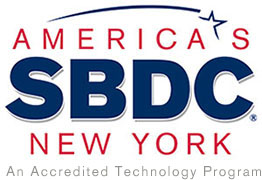
The impacts of Coronavirus (COVID-19) on society and business activities are difficult to assess and are changing daily. Small businesses need to be resilient and prepared to manage the challenges of the coming weeks and months. Click here for guidance and resources to help business owners adapting to an unpredictable situation. http://www.nyssbdc.org/Coronavirus.html
There is an expanding outbreak of COVID-19 caused by a novel (new) coronavirus. COVID-19 is a respiratory disease that spreads from person-to-person much like the flu but more contagious.
COVID-19 can cause varying degrees of illness depending on the overall health of the person exposed to it. Older people and those with chronic medical conditions such as heart, lung or kidney disease are more likely to experience serious COVID-19 sickness. Ongoing spread has occurred across the US and in many international locations.
As this virus spreads, it will have an effect on business. There are steps that can be taken to minimize exposure and contain the effect on business. Anticipate that there will be an impact on employee attendance, travel, and international trade. Employers need to consider how to help prevent the spread of the virus and to ensure the continuation of business.
Actions businesses can take:
What Everyone Should Do
Symptoms that Require Medical Attention
Recommendations for Small Business (Source: CDC.gov)
| Potential mitigation activities for business | |||
| Workplace | Preparedness | Minimal to moderate | Substantial |
| Know where to find local information on COVID-19 and local trends of COVID-19 cases.
Know the signs and symptoms of COVID-19 and what to do if staff become symptomatic. Review, update, or develop workplace plans to include: Liberal leave and telework policies. Consider 7-day leave policies for people with COVID-19 symptoms. Consider alternate team approaches for work schedules. Encourage employees to stay home and notify workplace administrators when sick (workplaces should provide non-punitive sick leave options to allow staff to stay home when ill). Encourage personal protective measures among staff (e.g., stay home when sick, handwashing, and respiratory etiquette). Clean and disinfect frequently touched surfaces daily. Ensure hand hygiene supplies are readily available in building. |
Encourage staff to telework (when feasible), particularly individuals at increased risk of severe illness.
Implement social distancing measures: Increasing physical space between workers at the worksite Stagger work schedules Decrease social contacts in the workplace (e.g., limit in-person meetings, meeting for lunch in a break room, etc.) Limit large work-related gatherings (e.g., staff meetings, after-work functions). Limit non-essential work travel. Consider regular health checks (e.g., temperature and respiratory symptom screening) of staff and visitors entering buildings (if feasible). |
Implement extended telework arrangements (when feasible).
Ensure flexible leave policies for staff who need to stay home due to school/childcare dismissals. Cancel non-essential work travel. Cancel work-sponsored conferences, tradeshows, etc. |
|
Travel
Check the CDC Traveler’s Health Notices for the latest guidance on international travel.
Travel restrictions are in place and some foreign nationals coming from affected countries are suspended from entry to the U.S. For current information, consult: https://www.cdc.gov/coronavirus/2019-ncov/travelers/index.html
Americans returning from affected areas may be screened and/or directed to areas where they may be isolated. Airports serving New York where travelers are being funneled for screening are John F. Kennedy International Airport (JFK), New York and Newark Liberty international Airport (EWR), New Jersey.
Additional Resources
Small Business Administration (SBA):
Guidance for Businesses and Employers to Plan and Respond to Coronavirus Disease (COVID-19)
Centers for Disease Control and Prevention (CDC):
Employers - Plan, Prepare and Respond to Coronavirus Disease
National Restaurant Association:
Coronavirus Information and Resources
NYS Department of Health- Novel Coronavirus (COVID-19):
https://www.health.ny.gov/diseases/communicable/coronavirus/
CDC guidance and resources for the US healthcare community:
NYC Stop the Spread of Coronavirus!
https://www1.nyc.gov/site/doh/health/health-topics/coronavirus.page
US Department of Labor - OSHA:
https://www.osha.gov/SLTC/covid-19/additional_resources.html
Coronavirus Disease Information for Travel:
https://www.cdc.gov/coronavirus/2019-ncov/travelers/index.html